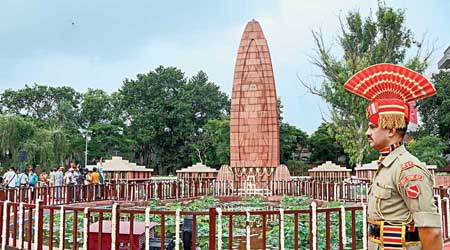Poor decision
Sir — The prime minister, Narendra Modi, seems to be bent on leaving a mark by distorting history (“Showtime”, Sep 2). A lot of measures have been adopted to revamp the historical Jallianwala Bagh during the last 100 years. But the latest renovation of the memorial — kitsch murals now adorn both walls of the main entrance — that was unveiled by Modi, has effaced the all traces of the massacre. This has drawn sharp criticism from scholars across the world.
The martyrs’ well, into which people had jumped to save their lives from the brutalities of the British — the then brigadier-general, Reginald Dyer, had ordered his troops to open fire on peaceful protesters — has now been encased in glass walls. A lotus pond around the memorial structure and a ‘light-and-sound’ show have also been added.
In the name of a facelift, Modi has done a great disservice to an edifice that has thus far borne testimony to one of the most tragic episodes in the nation’s history. Jallianwala Bagh is a site of grief; the pompous look that the government has bestowed on it does not correspond with its solemn spirit. The venue should not have been tampered with.
The renovation of the Jallianwala Bagh began in its centenary in 2019. But the project — it cost over Rs 20 crore — has ended up desecrating history.
Rabindranath Sarkar,
Calcutta
Sir — Sixty years after the Jallianwala Bagh memorial was inaugurated by the former president, Rajendra Prasad, to honour the martyrs of the 1919 massacre, the Narendra Modi government decided to turn them into protagonists of a sound-and-light show. Even the famous ‘shahidi khu’ or martyrs’ well is now enclosed in a glass shield, and the entrance has been covered by murals. Can this be called renovation?
People are naturally angry about this development. They want to ask the prime minister if this is how he wishes to protect the country’s history. How can his government inspire the younger generation after erasing the last traces of such a historic event? This is an insult to freedom fighters like Udham Singh. But not much can be expected of the ruling dispensation in India. After all, it is common knowledge that the Rashtriya Swayamsevak Sangh, the ideological antecedent of the Bharatiya Janata Party, contributed little to the country’s freedom struggle.
The Centre must not forget that Jallianwala Bagh is not a place of celebration; but one of mourning and of deep, abiding grief. The attempt to turn it into a tourist site is shameful.
Bidyut Kumar Chatterjee,
Faridabad
Lost star
Sir — It was heart-breaking to learn that the author, Buddhadeb Guha, died of post-Covid complications at the age of 85. This has left a deep void in Bengali literature. Guha’s passion for forests was reflected in many of his works — Kojagar and Madhukari, for instance. His novels played a crucial role by presenting a true picture of the plight of tribal communities. His bold writing style will surely inspire future generations.
Jayanta Datta,
Hooghly
Sir — The demise of Buddhadeb Guha, the eminent writer, is a colossal loss to the literary and cultural fraternity of Bengal. Guha’s early travels left a profound imprint on his mind, which found expression in many of his works.
Guha donned many hats. Besides being a literary stalwart, he worked as a chartered accountant, and was also a noted classical singer, a proficient illustrator and painter. Like his fictional characters, Guha desired to lead life on his own terms. He wrote over 150 books, including novels, short stories, poems and travel literature. Guha also achieved fame as a writer for children. His characters — Rijuda, a hunter-turned-conservationist, and his side-kick, Rudra — are still popular among young readers. But Madhukari, a novel on honey-gathering, is arguably his best work. During his lifetime, he won a number of awards — including the Ananda Puraskar, Shiromani Puraskar and Sharat Puraskar. It will be difficult to fill the void he has left behind.
Ashoke Basu,
Baruipur
Take a bow
Sir — Cricket fans across the world are shocked to hear that the South African fast bowler, Dale Steyn — fondly called Steyn Gun by his fans — has announced his decision to retire from all forms of cricket (“Steyn ends his long & fine spell”, Sep 1). Steyn has a record of 439 wickets in Test cricket, 196 in one-day internationals and 64 in Twenty20 matches. His skills will be thoroughly missed on the field.
Uddipta Sen,
Calcutta
Sir — It is saddening to think that we will now be deprived of watching Dale Steyn’s famous run-up live. However, one must thank him for his contributions to the game — after all, an economy-rate of 3.65 is no mean feat for a pacer. One hopes that he continues to inspire the youth, and enrich cricket as a coach, commentator or administrator.
Anshuman Sinha,
Howrah
Make a plan
Sir — The demand for the reopening of educational institutions is on the rise. To this end, students from a premier university in Calcutta are holding classes out in the open. While, reopening classrooms without adequate planning would entail an enormous risk — especially with the recent spike in Covid cases — students cannot be indefinitely deprived of classroom teaching. The government, in collaboration with educationists, should come up with an alternative. Allotting safe, sanitized spaces for students, especially those who cannot afford online education, could be one way of dealing with the problem.
Karabi Mukherjee,
Calcutta










